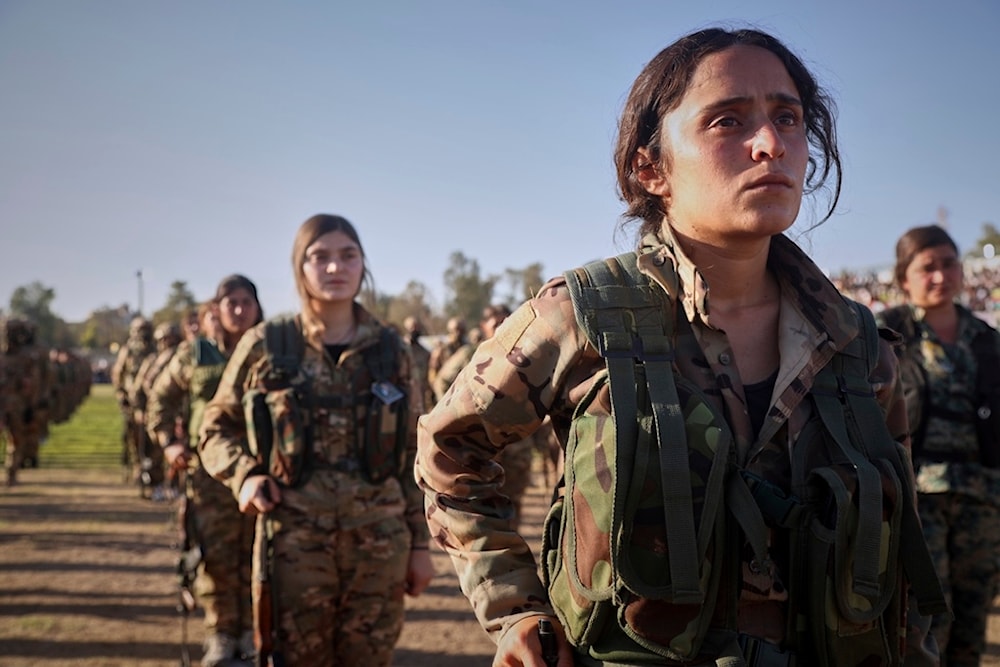Damascus, SDF trade accusations over deadly Aleppo clashes
Syria’s Defense Ministry says SDF shelling killed two civilians in Aleppo, while the SDF claims it foiled infiltration attempts by Damascus forces.
-

Female fighters from the Syrian Democratic Forces (SDF) attend a military parade before the funeral of senior Kurdistan Workers' Party (PKK) leader Nuredin Sofi, whose body was returned from Iraq's Kurdistan region after he was killed in a strike on Mount Gara in April 2021, in Qamishli, northeastern Syria, Tuesday, August 12, 2025. (AP)
Areas in the eastern Aleppo Province in Syria came under heavy shelling on Thursday by the Syrian Democratic Forces (SDF), which said they had repelled infiltration attempts by Syrian government forces in the city of Deir Hafer, east of Aleppo.
In a statement, Syria’s Ministry of Defense said SDF units launched an intense barrage from positions in the Jarragh military airbase and on the outskirts of Maskanah, targeting homes in the villages of al-Kiyariya, Rasm al-Ahmar, and Habouba Kabir in the eastern Aleppo countryside; an action the ministry described as “irresponsible and unexpected.”
The ministry added that it mobilized forces in the area and began targeting the sources of fire after “two civilians were killed and others wounded,” according to its account.
Local sources also reported that shelling from SDF positions hit the village of al-Kiyariya, under the control of armed groups aligned with Syria’s Ministry of Defense, killing two people and injuring nine others.
For its part, the SDF said its fighters had repelled “infiltration attempts and artillery attacks” by “rogue groups affiliated with the Damascus government in the Deir Hafer area,” stressing that the attempts “completely failed.”
The SDF held the Syrian government “fully responsible for initiating these hostilities through repeated violations that threaten overall stability,” while assuring residents that “the situation is fully under control” and that its forces remain on constant alert to counter any new breaches.
On August 11, the SDF accused groups linked to the Syrian Transitional Authority of carrying out provocative moves and violating the ceasefire in several areas, citing “suspicious activities” particularly around Deir Hafer and nearby villages.
Wider context
Tensions between the two sides first escalated in August, following political disputes stemming from an SDF-organized conference and the subsequent withdrawal of the Damascus government from negotiations that were scheduled to take place in Paris.
A senior Syrian government official reaffirmed in early August the right of citizens to peaceful assembly and constructive dialogue within the framework of a unified national project that upholds Syria’s territorial integrity, sovereignty, and the unity of its people.
Speaking to the Syrian Arab News Agency (SANA), in response to the conference organized by the Syrian Democratic Forces (SDF) in al-Hasakah, the official stated at the time that religious and ethnic groups have the full right to express their political visions and establish parties within the framework of the law. However, such activity must remain peaceful, refrain from taking up arms against the state, and avoid imposing a unilateral vision for the structure of the Syrian state, according to the official.
They stressed that the form of the state cannot be decided through factional understandings or local agreements, but only through a permanent constitution ratified by popular referendum, ensuring equal participation for all Syrians. Any political proposal, they added, must be addressed through public dialogue and the ballot box, not through threats or armed force.
The official said what took place in northeastern Syria does not represent a unifying national framework, but rather a fragile coalition of actors “harmed by the Syrian people’s victory and the fall of the old regime,” reliant on foreign support. Such groups, they argued, use conferences like this to evade future national commitments while ignoring “state constants based on one army, one government, and one country.”
At the time, Damascus condemned the hosting of separatist figures and individuals involved in hostile acts at the conference, calling it a flagrant violation of the March 10 agreement. The government held the SDF and its leadership fully responsible for the legal, political, and historical consequences of this breach, describing the gathering as an attempt to internationalize Syrian affairs and reimpose foreign sanctions.

 4 Min Read
4 Min Read










